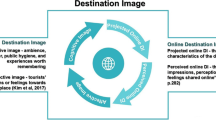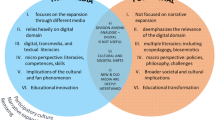Abstract
Transmedia fictions in Asian countries such as China and Japan are continually improving, and related research is multifaceted and cuts across disciplines. Transmedia websites are the main communication channel for this fiction, and this article seeks to promote an improved understanding by engaging with them in more depth and detail. It does this by exploring cultural participation in transmedia fictions and analyzing the message content in the comment area of China’s largest related website, which allows users to leave messages and engage in free and open discussions, opening up a range of typesetting possibilities. The book review section of the transmedia fiction Lord of the Mysteries, which has been read by tens of millions provides 1000 book reviews, is then used to analyze topics that most interest users. It is concluded that users are most interested in novel types, characters, and plots and orientate towards social and cultural content and some popular science knowledge. When they are part of a community, meanwhile, they gravitate towards transcultural issues, niche knowledge topics, and peer culture. This article makes an important contribution by clarifying the participation, communication, and learning potential of transmedia fictions and also shows how transmedia fictions can improve cultural learning and communication.








Similar content being viewed by others
Availability of Data and Materials
Data sharing is not a concern, as no datasets were generated or analyzed.
Notes
The Cthulhu Mythos is a mythopoeia and a shared fictional universe, originating in the works of American horror writer H. P. Lovecraft.
References
Benson, P. (2015). Commenting to learn: Evidence of language and intercultural learning in comments on YouTube videos. Language Learning and Technology, 19(3), 88–105. https://bit.ly/2nfD7uB
Chen, G. M., & Pain, P. (2017). Normalizing online comments. Journalism Practice, 11(7), 876–892.
Chinanews.com. (2021). Why is the phenomenal web novel “Lord of the Mysteries” so popular? https://baike.baidu.com/reference/22466085/a07drfZ1mIMLzrK6PdTDDNvkGO1T91Ezv2YTNVpSG37e4dCNH9Oes0NBTb30XqO4XNSeQNopYie1KlJlWQNzzp0DNGt5SJtgVeZN7CN-gC78_1U
Chinese Writers Network. (2021). China Literature Searchlight Book Criti’s Best Book List 2020 Annual Novel Top 10 Freshly Baked. https://baike.baidu.com/reference/22466085/71c6iScA0-8w6QmYLNzbvfwdg75L0ghZgyDngKszNeiGMZ26BAlUI_Yh-lX653Cg-F9QOSt8-vln7GfQqa9WMbUq4ePEYNVbBOcgNL8NzFCaFWpRxvIbuIpiiE4d
Gee, J. (2005). Semiotic social spaces and affinity space. In D. Barton, & K. Tusting (Eds.), Beyond communities of practice: Language, power, and social context, pp.214–232. Cambridge: Cambridge University Press. https://doi.org/10.1017/CBO9780511610554.012
Herring, S. C. (2004). Computer-mediated discourse analysis: An approach to researching online behavior. In S. A. Barab, R. Kling, & J.H. Gray (Eds.), Designing for virtual communities in the service of learning, pp. 338–376. New York: Cambridge University Press. https://doi.org/10.1017/CBO9780511805080.016
Hsiao, C. (2015). The verbal art of tucao and face-threatening acts in danmu screening. Chinese Language and Discourse, 6(2), 109–132. https://doi.org/10.1075/cld.6.2.01hs
Jenkins, H. (2003). Transmedia storytelling: Moving characters from books to films to video games can make them stronger and more compelling. https://bit.ly/22v1yRK
Jenkins, H. (2006). Convergence culture: Where old and new media collide. New York University Press.
Jenkins, H. (2010). Afterword. In M. Knobel & C. Lankshear (Eds.), DIY media: Creating, sharing and learning with new technologies (pp. 231–254). Peter Lang.
Jenkins, H., Clinton, K., Purushotma, R., Robinson, A. J., & Weigel, M. (2009). Confronting the challenges of participatory culture: Media education for the 21 century. The MIT Press.
Johnson, D. (2013). Polyphonic/pseudo-synchronic: Animated writing in the comment feed of nicovideo. Japanese Studies, 33(3), 297–313. https://doi.org/10.1080/10371397.2013.859982
Muddiman, A., & Stroud, N. (2017). News values, cognitive biases, and partisan incivility in comments sections. Journal of Communication, 67(4), 586–609. https://doi.org/10.1111/jcom.12312
Phoenix.com. (2021). Lord of the Mysteries is popular at the Bangkok Book Fair, leading a new wave of global online literature. https://baike.baidu.com/reference/22466085/3660BvsjmT9PT8GjXOoI2thgluQlhBc8AXyIY7-BwEHoB_CX3Sgv57dr5svhMiPsw0FU2H5li4lVCcl6kiZV8P3Gys8
Sohu.com. (2020). The results of the 4th Orange Melon Internet Literature Award and Witness Internet Literature 20-year Selection Annual Awards have been announced. https://baike.baidu.com/reference/22466085/26c6GeUVzlMpv6hVv76ARilmT0Y6mOx1eNGgwB3b_KR7X63Uwp7Zh15gMbp5sPgz1gzyEKbgB3QRB0jIuVL-efjlJ-MhZaE
Sohu.com. (2022). 60% of the new users are born after 1995. How does this 20-year-old web platform maintain its vitality? http://society.sohu.com/a/554352983_121286085
Sohu.com. (2022). Lord of the Mysteries offline signing event. https://yule.sohu.com/a/588107091_121118915
Torrego, A. & Gutiérrez, A. (2016). Ver y tuitear: Reacciones de los jóvenes ante la representación mediática de la resistencia. [Watching and tweeting: Youngsters’ responses to media representations of resistance]. Comunicar, 47(XXIV), 9–17. https://doi.org/10.3916/C47-2016-01
Tuzel, S., & Hobbs, R. (2017). El uso de las redes sociales y la cultura popular para una mejor comprensión intercultural. [The use of social media and popular culture to advance cross-cultural understanding]. Comunicar, 51(XXV), 63–72. https://doi.org/10.3916/C51-2017-06
Wong, L., Sing-Chai, C. & Poh-Aw, G. (2017). Aprendizaje de idiomas «sin costuras»: Aprendizaje de segundas lenguas y redes sociales.[Seamless language learning: Second language learning with social media]. Comunicar, 50(XXV), 9–21. https://doi.org/10.3916/C50-2017-01
Zhao, J. (2022). China’s sprawling world of web fiction. The China Project. Accessed August 17, 2022. https://thechinaproject.com/2022/08/17/chinas-sprawling-world-of-web-fiction/
Zhou, C., Tang, M., & Gao, Y. (2021). The game of discourse power between readers and authors under the comment mechanism of online literature platform——Taking Jinjiang literature city as an example. Science and Technology Communication, PP161–163.
Author information
Authors and Affiliations
Contributions
Ph.D. Han Xu is the only author involved in writing the manuscript. Professor Javier Gonzalez Patiño and Professor José Luis Linaza , these two authors revising it critically for important intellectual content, contributed equally to this work and jointly supervised this work.
Corresponding author
Ethics declarations
Ethical Approval
This article does not involve human participants.
Consent to Participate
This article does not involve human participants.
Competing Interests
The authors declare no competing interests.
Additional information
Publisher's Note
Springer Nature remains neutral with regard to jurisdictional claims in published maps and institutional affiliations.
Rights and permissions
Springer Nature or its licensor (e.g. a society or other partner) holds exclusive rights to this article under a publishing agreement with the author(s) or other rightsholder(s); author self-archiving of the accepted manuscript version of this article is solely governed by the terms of such publishing agreement and applicable law.
About this article
Cite this article
Xu, H., Patiño, J.G. & Linaza, J.L. The Phenomenon of Cultural Exchange and Learning Reflected in the Transmedia Fiction Comment Area: Taking Lord of the Mysteries as an Example. Hu Arenas (2023). https://doi.org/10.1007/s42087-023-00387-x
Received:
Revised:
Accepted:
Published:
DOI: https://doi.org/10.1007/s42087-023-00387-x




